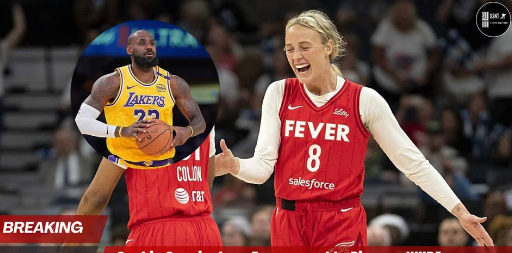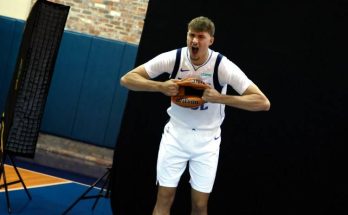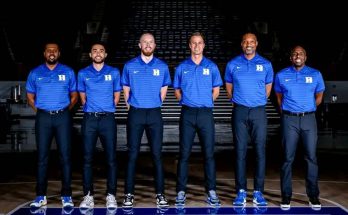In the wake of a surprising and widely criticized comment regarding the WNBA’s expansion to Cleveland and Detroit, Indiana Fever guard Sophie Cunningham has been advised by none other than basketball Hall of Famer Nancy Lieberman to engage in a conversation with NBA superstar LeBron James. This suggestion comes as Cunningham faced significant backlash for questioning the appeal of playing in these new WNBA markets, inadvertently sparking a debate about player preferences, city reputations, and the fervent passion of Midwest sports fans.
The controversy erupted on Tuesday, July 1, 2025, when Sophie Cunningham, a seasoned WNBA veteran who joined the Indiana Fever in a four-team trade on January 31, 2025, during a media session, expressed skepticism about the league’s newly announced expansion cities. The WNBA had just confirmed its ambitious plans to expand to 18 teams by 2030, with Cleveland (2028), Detroit (2029), and Philadelphia (2030) joining previously announced teams in Toronto and Portland (2026). Cunningham remarked, “I don’t know how excited people are to be going to Detroit or [Cleveland],” further suggesting that cities like Miami, Nashville, and Kansas City would be more appealing to players, citing “Broadway, the off-court lifestyle.” She also questioned whether the league was expanding “too fast.”
Cunningham’s comments, particularly her perceived slight against Cleveland and Detroit, swiftly drew criticism from across the sports world. Both the City of Cleveland’s official X (formerly Twitter) account and the City of Detroit’s account retorted publicly, defending their legacies as passionate sports towns with rich basketball histories. Cleveland’s account notably shared a clip of Cunningham’s Fever teammate, Caitlin Clark, praising the city during the 2024 NCAA Final Four, quipping, “Sophie, your teammate doesn’t seem to think Cleveland is too bad! We’re proud to have been chosen to host a WNBA team, and any player who comes here will feel that legendary passion Cleveland sports fans show our teams.” Detroit’s response highlighted its former WNBA team, the Shock, which won three championships and boasted impressive attendance figures, stating, “Detroit is a sports town. We’re sure we’ll see the same excitement for the WNBA returning.” NBA players like Donovan Mitchell and Tristan Thompson, both with strong ties to Cleveland, also weighed in to defend the city.
In response to the mounting criticism, Cunningham issued a clarification, stating she “would never speak down upon middle-class, blue-collar, working people” and emphasizing that she was primarily referring to “off-court lifestyle” factors. “That’s where I come from,” she added, “I’m from Missouri. I get I’m in Indiana, and that’s kind of why I’m hinting at Broadway sounds fun. Sophie in Miami, sounds fun.”
It was amidst this swirl of controversy that Nancy Lieberman, a Naismith Basketball Hall of Famer and former coach of the now-defunct Detroit Shock (from 1998-2000), offered her insightful advice. In a TMZ interview, Lieberman suggested, “She might wanna talk to LeBron James or Grant Hill about what it’s like to play in Cleveland or Detroit.” Lieberman’s point was clear: personal experience in a city often reveals a depth of fan passion and loyalty that might not be immediately apparent from an “off-court lifestyle” perspective. “I don’t know if it’s cities that she maybe has frequented,” Lieberman continued. “But if she were there, she would understand the fandom, the support, and how loyal those cities are to their fanbase.”
LeBron James is arguably the most iconic athlete to ever come out of Northeast Ohio and arguably the greatest player in NBA history. His career is inextricably linked with Cleveland.
- The Return and Championship: James’s decision to return to the Cleveland Cavaliers in 2014, after leaving for Miami, was a profound act of loyalty and a testament to his understanding of the city’s yearning for a championship. His delivery of the 2016 NBA title, breaking a 52-year championship drought for Cleveland sports, solidified his legendary status and deeply ingrained him in the fabric of the city’s identity. He experienced firsthand the immense, passionate, and often starved fanbase of Cleveland.
- Deep Roots and Understanding: Beyond basketball, LeBron James has deep roots in Akron, Ohio, just south of Cleveland. He understands the blue-collar ethos, the resilience, and the profound connection the people of the region have to their sports teams. His foundation and community work in the area further cement his understanding of the local culture and values.
- Global Perspective, Local Heart: While James is a global icon with homes and interests in major markets like Los Angeles, his Cleveland ties remain incredibly strong. He can speak to both the allure of major metropolitan centers and the unique, fierce loyalty found in places like Cleveland and Detroit.
- WNBA Ownership Interest: It’s also worth noting that LeBron James has expressed interest in WNBA ownership in the past, famously tweeting in 2021 about assembling an ownership group for the Atlanta Dream. While his current focus remains on his playing career and his existing investments, his general support for and interest in the WNBA positions him as a credible voice on the league’s expansion.
The WNBA’s expansion is a direct response to the league’s unprecedented growth in popularity and financial viability, largely fueled by a new generation of stars like Caitlin Clark and Paige Bueckers.
- Financial Investment: The new expansion fees are astronomical compared to previous eras. The Golden State Valkyries (who began play in May 2025) paid $50 million, while Toronto and Portland (2026) paid $115 million and $125 million, respectively. Cleveland, Detroit, and Philadelphia’s ownership groups (all with NBA ties) are paying a staggering $250 million each to join the league. This substantial investment indicates serious commitment from ownership and a belief in the league’s long-term potential.
- Historical Context: Both Cleveland and Detroit have previous WNBA histories. The Cleveland Rockers were one of the WNBA’s original eight teams (1997-2003), while the Detroit Shock (1998-2009) won three championships before relocating. While both franchises eventually folded or moved, the current WNBA landscape is vastly different, marked by surging interest and greater financial stability.
- Player Voice vs. League Growth: Cunningham’s comments, while controversial, do highlight a valid tension point: where do players want to play, versus where does the league see strategic growth opportunities? While “lifestyle” cities like Miami, Nashville, and Kansas City may hold appeal, the league’s expansion decisions are based on market viability, ownership commitment (especially NBA ties), existing infrastructure (arenas), and a proven fanbase. The WNBA’s commissioner Cathy Engelbert has emphasized a holistic approach to expansion.
- Culture of Fan Passion: Cleveland and Detroit are undeniably blue-collar, passionate sports cities. Their fans are known for unwavering loyalty, even through lean years. The response from the cities themselves, and local athletes, demonstrated a strong sense of pride and a readiness to embrace a WNBA team with fervor.
Nancy Lieberman’s counsel to Sophie Cunningham is more than just a suggestion; it’s a bridge-building opportunity. A conversation with LeBron James could provide Cunningham with invaluable insight into the profound connection between a city and its sports teams, particularly in a market like Cleveland. It would illuminate that “excitement” to play isn’t solely defined by an “off-court lifestyle,” but profoundly by the unwavering passion and loyalty of a dedicated fanbase, something both James and the cities of Cleveland and Detroit embody so fiercely. It’s a chance for a rising star in the WNBA to understand the deeper currents that define professional sports, especially in the evolving landscape of women’s basketball.



